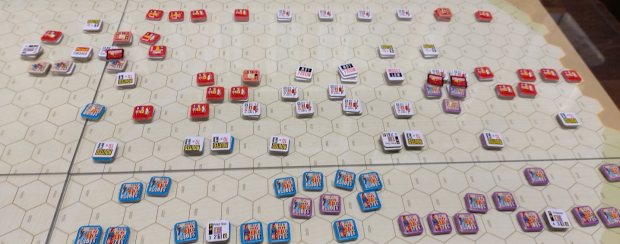
May 2022
This month's voice:
Phillip Schrank, "Changing My Perspectives—And Pedagogy—Through Games"
Introduction
Lindsay Herron
Editor, KOTESOL Voices
I always find it fascinating to discuss education and pedagogy with KOTESOL members whose teaching responsibilities extend beyond EFL. This month's issue of KOTESOL News features one such contributor: former national treasurer (and current Gwangju-Jeonnam Chapter treasurer) Phillip Schrank, who has moved from teaching EFL to teaching political science at a university in Gwangju. Phil's piece this month deftly interweaves the personal and pedagogical as he explores how gaming changed his perspectives, enriched his life, and inspired his teaching. Happy reading!
Changing My Perspectives—And Pedagogy—Through Games
Phillip Schrank
When I read through the past KOTESOL Voices articles to try and get some motivation, I thought, well the past articles were all unique. They were about some specific or general situation that made the person stand out in some way or another. So, I thought, what makes me unique? Well, I’ve been in Korea for over 10 years; I’m married to a wonderful Korean woman who I met here. I’ve had medical emergencies in Korea; I’ve navigated the medical system to such an extent that my medical Korean vocabulary is actually quite high. I’m working my way through a PhD from a Korean school.
But honestly, all of these things are not so unique. There are a plethora of foreigners married to Koreans; many people have had medical emergencies; and more and more people are going to graduate school at a Korean university. So what can I offer to this space?
Gaming. Not just gaming, but wargaming. That makes me relatively unique. Wargaming is an obscure hobby worldwide; but in Korea, there are only a small handful of people, both Korean and foreign, who play wargames regularly. But before I get into that, I would like to tell a story.
I never was big on gaming. I always felt that “gamers” were geeks, and I didn’t want to be a part of that. That really is a shame, by the way, because in Gwangju, where I live, there used to be a pretty nice gaming convention put on by a bunch of dedicated gamers. I didn’t actually get into gaming until I moved to Seoul and started my PhD. One of my fellow students was an avid wargamer. He introduced me to a simplistic card-based game based on ancient warfare. Well, I was hooked. Now, I am a history buff. My undergrad is in history, and I enjoy reading military history books and journal articles. Wargaming is exactly what any military historian can enjoy. As a matter of fact, a large number of wargames are designed by people with a military or military history background. I had never imagined wargaming could be so fun and interesting.
Move forward a couple years, and I find myself back in Gwangju and teaching political science at Chosun University. I still play wargames with my friends in Seoul, online often, and a couple of times a year in Seoul to play face-to-face. I have a wargaming buddy here in Gwangju, and we try to get together a couple of times a month for a day of gaming. I’ve also immersed myself into Euro-style gaming, and we usually get together as much as we can during semester breaks.
I have completely changed my perspective. I consider myself a “gamer” and a “geek” quite proudly. But wargames especially are hard to find in Korea, and wargamers are even harder to find! I often play solo, either playing both sides or I simply play games that were designed to be played solitaire.
Thankfully, because of the internet, it is easy to find information and dedicated wargamers to help with difficult rules or situations that you inevitably encounter. This is where the military historian in me really gets excited. One type of wargame is called conflict simulation. These are games that try to give an accurate simulation of historical battles (or future hypothetical battles) that include up-to-date orders of battle, all of the different types of equipment a military unit would have, etc. I have one game, Advanced Squad Leader, that has a rulebook that is several hundred pages long. Some of the games are so realistic that militaries around the world actually use them to simulate battles and test leaders on tactics and strategies. Military academies in the U.S. use wargames to teach cadets. My friend in Seoul uses wargames to teach some of his classes. I thought, why shouldn’t I do the same?
At Chosun, I teach an introductory class in American politics. I go through American history from foundation up to present day, lecturing on the basics of America’s democracy and political system. I thought that would be the perfect class to use a game to better teach my students. But what game would work? It is a politics class, so is there a game that depicts American politics? There are actually a couple. There is a game about the 1960 presidential elections, where John F. Kennedy was up against Richard Nixon for the presidency. That could be a possibility, but 1) I don’t own it, and 2) it is only a two-player game. In a class of up to thirty students, it would be difficult for all students to be engaged.
In the several years I have taught American politics, I have noticed that my students rarely understand the American Revolution. There are many aspects of the American Revolution that are quite difficult to understand: the reasons behind the revolution, the influence of the French, the importance of Native American tribes, etc. Then I found it! I had the perfect game to help my students better understand the American Revolution.
The game is called Liberty or Death: The American Insurrection. The game treats the American Revolutionary War as an insurrection and counter-insurgency that pits the American colonists against the British Empire, with the French helping the Americans and the Native Americans helping the British. But of course, the French and Natives were not just helping the Americans and British; they were out for themselves and fighting for their own goals. What makes this even better is that I have a ruleset in Korean, along with translations for all cards and player aids. The cards have “flavor” text that explains the situations and events to help the students better understand the history.
I spend one class session teaching the rules and dividing the class into four groups, explaining what each group is trying to achieve and how to go about achieving those goals. Then I spend another class period walking through the game with students and acting as a moderator. I love how students on the same team discuss and debate the best possible action and come to a consensus on what they should do each turn. After that week, I invite students to play a longer scenario on a completely volunteer basis after class. I always have enough students to play. And when student evaluations are written, that is always my most popular class, and students always mention the game and how it helped them better understand the American Revolution. I have plans for using games in other classes I have designed, but I haven’t had the chance to teach them yet.
I am truly happy I have changed my perspective on gaming. Not only is it a wonderful hobby and social activity, but it can be educational and useful in the classroom. I wish I wasn’t so close-minded earlier in my life, but at least I have learned from that mistake and made the most of it.
About the Author

Phillip Schrank moved to Korea in 2009, first living in Gwangju, moving to Seoul in 2013, and then moving back again to Gwangju in 2018. Currently, he is teaching political science at Chosun Univerisity and writing his dissertation on international relations from Korea University.


